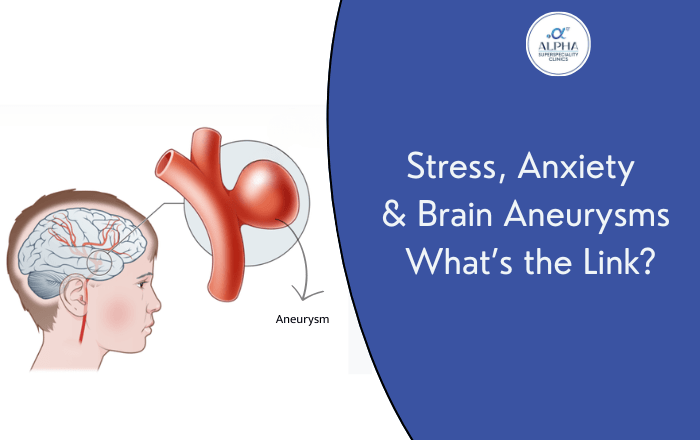In today’s fast-paced world, stress and anxiety have become part of everyday life. Whether it’s work pressure, personal struggles, or health concerns—many of us feel mentally overwhelmed. But have you ever wondered if stress and anxiety could do more than just affect your mood? Could they actually increase your risk of a serious condition like a brain aneurysm?
This article will help you understand what a brain aneurysm is, how mental stress might be linked to it, and what signs to watch for. If you’re living with constant stress or anxiety, it’s important to know how this might affect your brain health.
What Is a Brain Aneurysm?
A brain aneurysm is a weak spot in the wall of a blood vessel in the brain that bulges or balloons out. Over time, the pressure of blood flowing through the vessel can cause this bulge to grow and potentially rupture, leading to bleeding in the brain, known as a hemorrhagic stroke.
Common Risk Factors for Brain Aneurysms:
- High blood pressure (hypertension)
- Smoking
- Family history of brain aneurysms
- Head injury or trauma
- Drug abuse, especially cocaine
- Certain genetic conditions
Not all aneurysms rupture. Some remain small and are discovered only through routine imaging. But when they do rupture, they can lead to sudden and severe symptoms—and may be life-threatening.
The Link Between Stress, Anxiety & Brain Aneurysms
– How Stress Affects the Body
Stress is more than just a mental feeling. When you’re under stress, your body reacts by releasing hormones like cortisol and adrenaline. These hormones cause your heart to beat faster and your blood pressure to rise. If stress becomes chronic—lasting for weeks, months, or even years—this ongoing strain can damage blood vessels, including those in the brain.
– Can Anxiety Make an Aneurysm Worse?
If you already have an unruptured brain aneurysm, sudden spikes in blood pressure—often seen during intense anxiety or panic attacks—could possibly increase the risk of rupture. While research is still ongoing, many doctors agree that stress and anxiety could act as triggers, especially in individuals with existing aneurysms or other risk factors.
– What Do Studies Say?
Some studies suggest that emotional stress might not cause aneurysms directly, but it can worsen conditions that lead to aneurysms, like high blood pressure. Sudden emotional events, including fear, anger, or pain, have been linked to aneurysm ruptures in a few medical reports.
Managing Stress to Protect Your Brain
– Simple Ways to Reduce Stress
Keeping stress under control can support both your mental and physical health. Here are a few tips:
- Practice deep breathing or meditation daily
- Exercise regularly—even a 30-minute walk helps
- Get enough sleep (7–8 hours per night)
- Avoid too much caffeine or alcohol
- Talk to someone—a friend, family member, or therapist
– When to Seek Help
If you’re feeling anxious most of the time, unable to relax, or facing physical symptoms like headaches, chest pain, or sleep problems, it might be time to talk to a medical professional. And if you have a known aneurysm or high blood pressure, managing stress becomes even more important.
Recognizing Symptoms of a Brain Aneurysm
Not all brain aneurysms show signs before they rupture, but here are some symptoms to watch for:
– Before Rupture:
- Headaches (especially one-sided)
- Pain above or behind the eye
- Dilated pupil or vision changes
- Numbness or weakness in one side of the face
– After Rupture:
- Sudden, severe headache (“worst headache of your life”)
- Nausea or vomiting
- Stiff neck
- Blurred or double vision
- Seizures
- Loss of consciousness
If you or someone around you has these symptoms, it’s important to go to the hospital immediately.
Brain Aneurysm Diagnosis and Treatment
Doctors usually diagnose brain aneurysms using imaging tests like MRI, CT scans, or angiograms. These tests help them understand the size, shape, and location of the aneurysm.
– Treatment Options May Include:
- Monitoring small, unruptured aneurysms with regular scans
- Surgical clipping to close off the aneurysm
- Endovascular coiling, a procedure done through the blood vessels
The right treatment depends on many factors, such as your age, health condition, and size of the aneurysm.
Concerned About Your Risk? Consult Dr. Ninad Patil
If you’re living with high stress or anxiety and are worried about your brain health, it’s a good idea to speak with a neurosurgeon.
Dr. Ninad Patil offers consultation for individuals with symptoms or risk factors for brain aneurysms. He helps guide patients through diagnosis and treatment, based on their specific condition. If you have a history of headaches, high blood pressure, or just want peace of mind, consider scheduling an appointment.
📞 Don’t wait—early detection can save lives.
FAQ
Q1: Can stress cause a brain aneurysm?
Stress itself may not directly cause an aneurysm, but it can increase blood pressure, which is a major risk factor.
Q2: Can anxiety lead to a brain aneurysm rupture?
Severe anxiety or panic attacks can cause sudden spikes in blood pressure, which may trigger a rupture if an aneurysm already exists.
Q3: How do I know if I have a brain aneurysm?
Many people don’t experience symptoms until it ruptures. Some unruptured aneurysms are found during tests for other issues. Regular check-ups are helpful if you’re at risk.
Take Action: Protect Your Brain Health
Your mental health plays a bigger role in your physical health than you may think. By understanding how stress and anxiety affect your body—especially your brain—you can take steps to protect yourself.
If you’re based in Pune and have concerns about brain aneurysms or related symptoms, consider consulting Dr. Ninad Patil for further evaluation.



